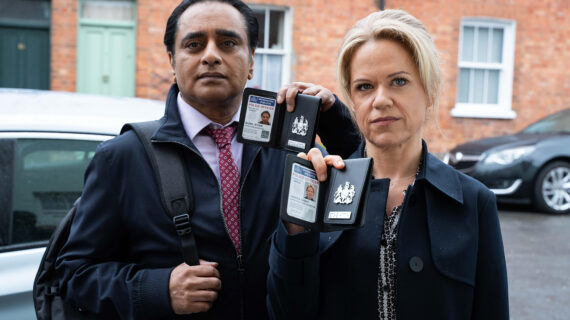Announcer:
A PBS Wisconsin original production. The following program is part of our “Here & Now” 2020 election coverage.
Frederica Freyberg:
I’m Frederica Freyberg. Tonight on “Here & Now,” a Wisconsin COVID-19 update from the Department of Health Services and U.S. Representatives Mike Gallagher and Mark Pocan discuss their new proposal that addresses medical supply shortages. It’s “Here & Now” for March 6th.
Announcer:
Funding for “Here & Now” is provided by the Focus Fund for Journalism and Friends of PBS Wisconsin.
Frederica Freyberg:
More people are being tested for coronavirus in Wisconsin. But at weeks’ end there are no new positive cases. The State Department of Health Services reports a total of 44 people have been tested and a dozen results are still pending. One person who tested positive earlier has recovered. Health officials also report there is no indication of community transmission in Wisconsin. Today the president signed on to $8 billion in emergency funding for states to help manage coronavirus response. Tom Haupt is the influenza surveillance coordinator for Wisconsin’s Department of Health Services. And thanks so much for being here.
Tom Haupt:
Thank you for the invitation. I appreciate being here.
Frederica Freyberg:
The numbers of people being tested has jumped in recent days. Does Wisconsin have adequate test kits to do the surveillance we need?
Tom Haupt:
At this time we do have enough test kits available. But we do have to approve the testing. We want to be sure we’re using the test kits appropriately and being smart with our decisions. We do not want to run out of kits during a very critical time.
Frederica Freyberg:
You have the capacity as well of the scientists who need to do the testing?
Tom Haupt:
Yes, at this time we have the capacity and we also have surge capacity should it get worse.
Frederica Freyberg:
What are the circumstances of the latest people who are being tested?
Tom Haupt:
The majority of them are travelers and vacationers coming back from some of the countries that have either a travel — a level three or level two travel alert. That would include China. It would include Italy, South Korea. We’re also getting students coming back as well. So we’ve had people who are put under investigations who are both vacationers and also students returning to Wisconsin.
Frederica Freyberg:
Ok, and those were students that were on study abroad type programs?
Tom Haupt:
Yes.
Frederica Freyberg:
There seems to be super heightened concern among the public. What should we know about the risk and what to expect?
Tom Haupt:
Again, this is an evolving situation and it is relatively early in the investigation. We are counting on our colleagues from the World Health Organization and the Centers for Disease Control and Prevention to guide us with more information. We want to learn more about the exact incubation period. How long people are infectious. At this point we’re saying the risk is still low but we’re prepared in case it does become more widespread. We feel we have the plans and capabilities to make a response to protect the citizens of Wisconsin.
Frederica Freyberg:
What is the guidance for nursing homes in Wisconsin?
Tom Haupt:
The guidance for nursing homes actually just came out. We’re analyzing that as we speak. The questions that have come up from nursing homes is do they need to screen visitors coming in and ask them if they had done any travel. At this point that is not recommended. But we really want them to be aware that people should not be coming in if they do have any kind of respiratory symptoms because we’re in the middle of a flu season and we’re still a very high influenza activity.
Frederica Freyberg:
Do you expect the number of tests being conducted will jump as the days progress here?
Tom Haupt:
I believe the number of tests will definitely jump especially since we have commercial labs coming online as well. And again, we have a little more leniency for testing since the guidance was changed this past week.
Frederica Freyberg:
How important is the money newly coming in to states?
Tom Haupt:
Yes, I believe the money is very important and as you said, is really not decided how to use that but it can help with personnel costs. For purchasing maybe some personal protective equipment. There is a lot of rumors out there there are shortages of masks, gowns, hand sanitizers. The people in our administrative office are working very hard to try to come up with a plan how to best use that money.
Frederica Freyberg:
Tom Haupt. Thanks very much and good luck.
Tom Haupt:
Thank you very much. Appreciate the opportunity for talking to your viewers.
Frederica Freyberg:
Now to COVID-19 and how federal lawmakers are responding to certain aspects of it including the introduction of a bill called the Medical Supply Chain Security Act. It’s designed to strengthen the flow of medical supplies by giving new authorizations to the Food and Drug Administration. Among other things the bill gives the FDA more power to locate and direct the flow of medical supplies and requires medical manufacturers to notify the government when supplies are running low. The bill was introduced this week by Republican U.S. Representative Mike Gallagher who joins us from Green Bay and Democratic U.S. Representative Mark Pocan who’s in Madison. Welcome to you both.
Mark Pocan, Mike Gallagher:
Thank you. Glad to be here.
Frederica Freyberg:
First to you Representative Pocan, why did you introduce this bill?
Mark Pocan:
Well, Mike reached out to us. Senator Hawley in the Senate introduced the bill. I’ve been dealing with through my subcommittee on appropriations all things coronavirus. There’s a real problem around supply chains period. We keep track somewhat of drugs produced in China but we don’t keep track of things like the active ingredients for drugs that are made in other places. And we don’t keep track of things for medical devices. When this bill came over from Mike’s office, we were very happy to do this with him. It’s an important information that we have to have whether it be on drugs or medical devices. If we don’t know in a time like this or any time in the future, you really need to know where things are produced so you don’t have shortages.
Frederica Freyberg:
Representative Gallagher, why did you spearhead this?
Mike Gallagher:
Well, I think COVID-19 really provides an acute illustration of something we’ve been learning over the last three years or waking up to, which is the fact that a lot of our supply chains run through Beijing and therefore are inherently fragile. As we attempt to incentivize more domestic manufacturing, we should start not only with key national security technology but medical manufacturing. And the fact is right now we’re learning that so many of the drugs we rely upon, so many of the simple devices that we need in times like this, whether it’s masks, respirators, they’re often mass produced in China. And that’s fundamentally unacceptable when you’re in the midst of dealing with something like COVID-19. This is one small way where we can begin to shore up and strengthen our domestic manufacturing capability and also keep our citizens healthy.
Frederica Freyberg:
Representative Pocan, what do you know, what can you tell us about shortages in place now as a result of coronavirus or potentially threatening our response to it?
Mark Pocan:
Sure, a week ago Friday I asked this very question at one of the panels we had. We know there is at least 20 drugs that are probably solely sourced in China that we’re watching very closely. There could be shortages because of production. There’s an overall list of about 146 drugs as of a week ago Friday on that list. But what we don’t keep track of are things like medical devices which is why Mike and I have this bill. We don’t keep track of active ingredients. So sometimes a drug may be produced in India or another country but the active ingredient that you can’t make the drug without is still produced in China. We don’t keep track of that at all. Those are some of the things we have to know or else you could have shortages here in the United States or you could even have China say that any production in China the priority is going to stay in China at some point in the future and that could cause problems.
Frederica Freyberg:
Representative Gallagher, this legislation would be for next time though, right? Because we’re currently in the circumstance where we have this over reliance on products made in China?
Mike Gallagher:
Yes, which is why it’s good we came together yesterday before Mark and I left D.C. to pass $8 billion in emergency supplemental funding to get at this crisis. $4 billion of which would be geared towards rapid production of testing. If you talk to officials in Hong Kong and in Korea, they will swear that fast, rapid deployment of testing is the path to getting a handle on this. That’s where we really need to be doing more. I’m glad most of our colleagues came together in a bipartisan fashion this week to provide the CDC and other health officials at HHS the resources they need in order to devolve resources to the states, to the county governments to do as much testing as possible.
Frederica Freyberg:
Representative Pocan, do you know at all how much of that $8 billion might be coming Wisconsin’s way?
Mark Pocan:
Not exactly. However, again even that money some of it is going for fighting the virus, a lot of other things, helping local and state health departments. The issue we have right now that we really have to focus the most on is the testing. And as of this week the numbers of tests still aren’t that many. By the end of next week, hopefully it’s at a level that will be more useful. My real concern is we’re not proactively testing more people especially people in hospitals who have pneumonia-like symptoms. We can’t just wait for people to come in. Unfortunately there has been bad press. People who’ve gone to get a test, tested negative and then wound up with a $3200 bill. That’s spooking people. We don’t really have some answers for how to make sure no one would be turned away because they don’t have the resources. It is definitely in progress as we’re figuring this out. There have been some missteps early on especially around testing. But I and a lot of medical people including Ron Klain who ran the Ebola crisis, he was the czar essentially during President Obama think we have to change focus and really start proactively testing these people and we’re not doing that right now.
Frederica Freyberg:
Representative Gallagher, do you agree with that? That testing is the key right now?
Mike Gallagher:
Well, I do think testing is the key. We have as I understand it CDC has loosened some of the regulations in terms of what facilities are allowed to test. I think one thing we should also be looking at in this space is how do we waive, if not lower the cost of telehealth procedures and assessment. There are limits to what you can do via telehealth but particularly as we try to prevent community spread. I’m hearing from a lot of hospital systems here in northeast Wisconsin that they’re worried about being in violation of Stark Law at the same time they’re trying to do more telehealth services right now. So there’s a lot of things we’re learning about the system right now which isn’t always operating in the most efficient way possible but yet another reason I’m glad Mark and I who, I think it’s fair to say probably disagree on a lot of healthcare-related issues, were able to come together on an area where we agree in the face of something like this. Put aside any partisan differences and try and do what’s best for Wisconsin.
Frederica Freyberg:
Representative Pocan, how do you think overall this outbreak has been managed by the Trump administration?
Mark Pocan:
It’s in progress. Clearly there have been some missteps early on. I would be much happier if the only people who were the spokespersons to the American people were doctors. Dr. Tony Fauci I think has respect from everyone: democrat and republican. Having a politician be the spokesperson is maybe not the best thing. Especially when they are saying you can go to work with the coronavirus. No, you shouldn’t. That would be an awful idea. What we know right now, the most important thing for everyone to know is wash your hands, cough into your elbow and don’t touch your face. And trust me that’s much harder. As they told us that I was holding my face in my hand at the briefing. If we follow that for most people, were in pretty good shape. But the problem is by not keeping track — earlier this week we quit keeping track of how many people we tested — now they’re doing that again after we raised some concerns. Certain populations, if you’re over 60 or you have some health ailments, 15 to 20% of people are going to wind up being hospitalized for this. We really have to be following this very closely so that the appropriate populations are protected.
Frederica Freyberg:
Representative Gallagher there seem to have really been some mixed messages out of the Trump administration from the president himself that fly contrary to what some of the scientific or medical officials are saying. What about that and how should citizens kind of understand what’s going on?
Mike Gallagher:
Well, I think the Trump administration was right to be forward leaning on the targeted travel ban in China. We now have the same in place for Iran and certain parts of Italy and South Korea. That’s something we need to continue to monitor. But in a globalized economy, where Mark and I know we fly on airplanes twice a week, it’s just hard where people are flying around all the time to fully contain the spread even with a targeted travel ban in place. Where I think we should be even more forward leaning as we try and think about the next time should there be a next time is let us recognize that the Chinese Communist Party out of fear of its own citizens’ knowledge has obfuscated on the origin of this disease, had refused the help of a lot of our CDC experts and thereby endangered global health. That’s something that we have not quite frankly been forceful enough on sending that message to everyone around the world. The CCP is a corrupt organization that is endangering the lives of people all over the world.
Frederica Freyberg:
We need to leave it there. Representative Gallagher in Green Bay and Representative Pocan here in Madison. Thanks to you both.
Mike Gallagher, Mark Pocan:
Thank you.
Frederica Freyberg:
While work is ongoing in Washington to help prevent medical supply shortages, doctors on the front line of the coronavirus outbreak are living it including Dr. Nasia Safdar, medical director of Infection Control at UW Hospital and Clinics in Madison. She’s also a professor of infectious disease and joins us now. Thanks very much for being here.
Nasia Safdar:
Thank you.
Frederica Freyberg:
We know your hospital treated the first and to date only person with coronavirus who has now recovered. But increasing number of tests are being done right now. What is your expectation as to the progression or how this develops?
Nasia Safdar:
I think we’re seeing global spread of the virus. Every day there is increasing number of cases being reported. I think it seems inevitable it will arrive here as well.
Frederica Freyberg:
Your hospital has instituted its preparedness plan including a hotline number which we want to just put up on the screen that is 608-720-5300. Who should use that hotline? What is it for?
Nasia Safdar:
Generally it’s for the public, UW health patients, those that might have questions about whether their symptoms need to be evaluated or if they have particular concerns about travel and symptoms.
Frederica Freyberg:
And how does that work? If someone feels they need to be seen, the expectation is not that they would just walk into the emergency room. Is that right?
Nasia Safdar:
Yes, I think an important aspect of containment is we want to be able provide the best care possible in all settings. We recommend that people call for two reasons. One is to evaluate whether one really needs to be seen, or are the symptoms mild that they would recover on their own. The other is to prepare the health system and healthcare workers and so on to receive them and provide the safest care possible.
Frederica Freyberg:
And yet, you must have had through your hospital and emergency room some of these people coming in suspecting that they had this virus.
Nasia Safdar:
Yes, that’s correct.
Frederica Freyberg:
And what do you do? How does that protocol work in terms of being prepared for that?
Nasia Safdar:
I think the protocol works is that we first screen to see what the risk is of COVID-19. Since we haven’t had any additional cases in Wisconsin thus far, we’re still focusing on travel and exposure to known cases to the extent the patient may be aware of. And then if there is such a risk, then what we do is we place them in these private rooms that are negative pressure rooms as recommended by the CDC. The healthcare workers will gown and glove and put on a respirator and then go in to assess them. Even though we’re of course focusing on diagnostic testing for COVID-19, there are other viruses that also need to be evaluated and tested for.
Frederica Freyberg:
Your plan also includes conserving personal protective equipment like masks, gloves, hand sanitizer. What’s the status of the stocks in your hospital of these things and what are you doing to conserve?
Nasia Safdar:
I think from the preparedness standpoint you just have to prepare a progressive escalation plan. So what do you do if there are a few patients? What do you do if there’s a few more than that and then if there’s a true surge? The way we conserve personal protective equipment is that ordinarily if there is no prospect of an eminent shortage or anything like that you would use a mask, which is a respirator in this case for healthcare workers. You would use it for one encounter and then you would dispose of it. But the CDC has guidance about how to extend the life of these respirators by reusing them for the same patient in multiple encounters. So those are things we have instituted. We think it’s really important only essential people enter the room of somebody who’s being evaluated and tested to preserve pp for the same reason so that’s being instituted as well. Then keeping a really close eye on inventory and auditing it to make sure usage is going as planned.
Frederica Freyberg:
Do you have any shortages of things like IV bags and even medicines?
Nasia Safdar:
At the moment that doesn’t seem to be the case. I think as things progress and escalate, we’ll just keep a really close eye on those things as well.
Frederica Freyberg:
In terms of escalation and progression, what concerns do you have about staff shortages in the event of a widespread outbreak?
Nasia Safdar:
I think what we’ve learned from other places that have experienced it is staff shortages are likely to occur if there are a number of cases in the health system and to be able to plan for that. It means being flexible and creative in thinking how best can the workforce be put to use. So for example, if a healthcare worker has to be out of work because for whatever reason they were exposed to somebody with COVID-19, they might feel well. Then in that case can telemedicine be used as a way to still allow them to participate in patient care. Individuals may be thinking about being flexible with the work they normally do and being able to do different work because as MD-trained physicians, we can be flexible in work. As can other members of the workforce.
Frederica Freyberg:
All right doctor. Thank you very much for your information.
Nasia Safdar:
Thank you.
Frederica Freyberg:
Now to the story of a Wisconsin man who has a very big personal stake in the future management of coronavirus. It’s the story of Kewanee native and UW-Parkside graduate James Malechek. Malechek has been quarantined since January 27 in Beijing, China. That’s where he is the strength and performance coach for the Chinese Olympic Swim Team. He and 500 swimmers and coaching staff were in the midst of a midwinter training camp preparing for the Tokyo Olympic Games when the coronavirus outbreak began. He joins us now from his Beijing apartment in a complex where he and his athletes are gated from the outside world. James, thanks very much for joining us.
James Malechek:
My pleasure.
Frederica Freyberg:
We understand again that it has been six weeks that you have been in isolation. What has that been like?
James Malechek:
It’s been an interesting experience. Many of the athletes and coaching staff have — we’ve built kind of a bond of understanding even though we’re from completely opposite sides of the world that we have a lot more in common. It’s been a very unique experience to say the least.
Frederica Freyberg:
Have you and your fellow coaches and athletes been tested for coronavirus?
James Malechek:
Yes. We initially when we got quarantined on the 27th we had been scheduled regularly for routine checks. Since then it’s been mostly temperature checks and occasionally some blood work to make sure that everyone is still free from the coronavirus.
Frederica Freyberg:
And to date that is true, that everyone is negative.
James Malechek:
So far I’ve heard zero people within this complex have had it.
Frederica Freyberg:
So still how frightening has it been to be in China during this deadly outbreak there?
James Malechek:
It’s been fairly controlled on our end. Even before we were put into isolation, we got told make sure you aren’t going into heavily crowded areas, certain parts of the city are known for larger traffic areas. They slowly started to wean us away from those areas and then since the quarantine we haven’t had any contact with the outside sources. So to me it’s — not bad.
Frederica Freyberg:
I was going to ask what about your Chinese swimmers or staff? Do they have families that they continue to be concerned about outside the isolation that you are now living in?
James Malechek:
Several of the coaches are actually from Wuhan originally and when the outbreak happened, we were already at training camp so they weren’t allowed to go home for spring festival and see their families, which their families are still in Wuhan and still in isolation. So some of the coaches are a little worried still and have obviously concern for their loved one, their families still trapped in Wuhan.
Frederica Freyberg:
What are your concerns right now?
James Malechek:
My biggest concern is just that everyone’s safety is still kept to a high standard. We’ve been in this quarantine for so long already that to me the safety has to be top priority still. As much as we would all like to get out and have the ability to go get different food or anything like that, we still have to remember first and foremost that we’re preparing for Tokyo. That’s got to be the end goal. That means spending more time in quarantine, so be it.
Frederica Freyberg:
Are you trying to get evacuated back to the United States?
James Malechek:
I have thought about it several times since the quarantine started. Initially my concern was fairly high about getting back to the U.S. but since we’ve been in here so long I’ve seen the precautions and the cleaning routines and the consistent checkups on this end. I’m indifferent because part of me wants to go home but the other part of me looks at this and goes we’ve been here for six weeks, you have zero cases, that’s a hard number to go against in my book. So part of me does.
Frederica Freyberg:
Part of you does and part of you wants to just stay put and see it through. How concerned are your family and friends back here in Wisconsin?
James Malechek:
Not as concerned as they originally were. Once I obviously been in contact with them and just talking them through and helping them to understand the way that the situation is, they stepped up all the cleaning and all the necessary precautions from this end. To me it’s very safe on my side for the time being. Now, I am a little concerned that if we were to be let out of quarantine that we’re obviously exposed to the risk. But the risk, is worth being outside of that quarantine.
Frederica Freyberg:
James Malechek, we really appreciate you checking in and telling us about the circumstance and we hope to check in with you in the future and good luck on your coaching duties.
James Malechek:
Thank you very much.
Frederica Freyberg:
Because of his role coordinating the U.S. government response to the coronavirus outbreak, Vice-President Mike Pence canceled a scheduled campaign stop in Onalaska Thursday. Post Super Tuesday the Pence stop in Wisconsin was expected to rally support for Donald Trump even as the dynamics for the democratic candidates shifted. The surprising rise of Joe Biden this week and the departure of major candidates save Bernie Sanders leave it a two-man race for the nomination. On that score, we checked in with UW-Madison Professor of Political Science David Canon who says Biden is in for an infusion hardly imagined just days ago.
David Canon:
Bloomberg has said he is going to continue spending and give Biden his whole operation of all of the stuff that he has on the ground right now in these states and continue spending. He’s indicated he’s going to spend all the way through the general election. Could be a billion dollars. It’s amazing.
Frederica Freyberg:
What does that mean for Bernie Sanders who won Wisconsin in 2016?
David Canon:
Well Sanders I think now is a long shot to win certainly a majority. Right now I think FiveThirtyEight, one of the leading prognosticators has Sanders at only an 8% chance of winning a majority of the delegates. Now he still could end up coming in close to Biden and neither of them having a majority. And so that is still a possibility. But even that seems less likely now.
Frederica Freyberg:
Wisconsin will not only make a democratic pick for president on April 7, voters will also choose the next state Supreme Court justice. Friday night, March 27th the candidates – incumbent Justice Daniel Kelly and challenger Judge Jill Karofsky – will be here for a live one-hour debate. Wisconsin Public Radio’s Shawn Johnson and I will moderate the event. That’s our program for tonight. I’m Frederica Freyberg. Have a great weekend.
Announcer:
For more “Here & Now” 2020 election coverage go to PBS.org and click on news. Funding for “Here & Now” is provided for the Focus Fund for Journalism and Friends of PBS Wisconsin.
Search Episodes
Related Stories from PBS Wisconsin's Blog

Donate to sign up. Activate and sign in to Passport. It's that easy to help PBS Wisconsin serve your community through media that educates, inspires, and entertains.
Make your membership gift today
Only for new users: Activate Passport using your code or email address
Already a member?
Look up my account
Need some help? Go to FAQ or visit PBS Passport Help
Need help accessing PBS Wisconsin anywhere?

Online Access | Platform & Device Access | Cable or Satellite Access | Over-The-Air Access
Visit Access Guide
Need help accessing PBS Wisconsin anywhere?

Visit Our
Live TV Access Guide
Online AccessPlatform & Device Access
Cable or Satellite Access
Over-The-Air Access
Visit Access Guide
 Passport
Passport

















Follow Us